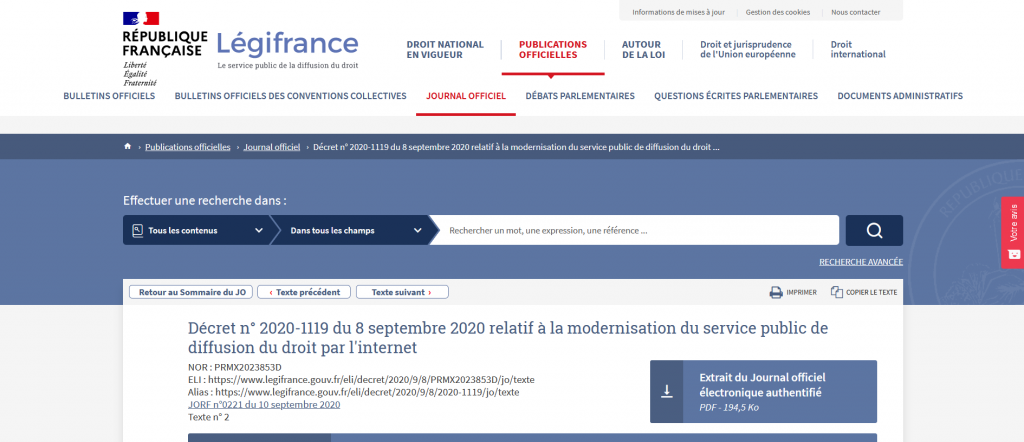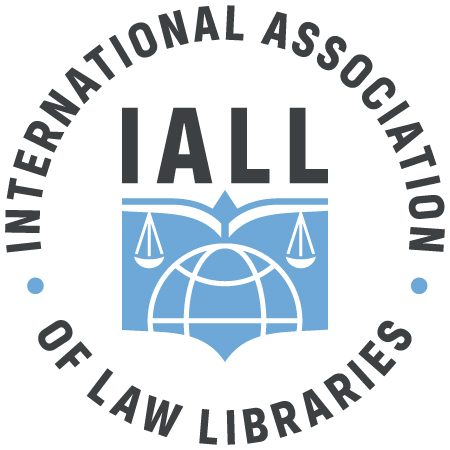
As of September 12, 2020 is a new version of the French portal, Legifrance, available. https://www.legifrance.gouv.fr/
What is Legifrance?
Legifrance is the French Government’s official website on French law. It is a public service for the dissemination of Law. Legifrance “raison d’être” comes from the principle that law should be accessible to everyone free of charge. As the adage says : “Nul n’est censé ignorer la loi” – nobody is thought to be ignorant of the law i.e. ignorance of the law is no excuse.
The Direction de l’information légale et administrative (DILA) is in charge of Legifrance.
The legal basis of the “new” Legifrance lies in the recent décret (decree) n° 2020-1119 September 8, 2020.The original 2002 decree contains a list of the legal texts that should be accessible free of charge. It has been amended by the décret n° 2020-1119 which completes the list of legal data made available to the public.
Legifrance gives access to the primary sources of French national law: Constitution, laws and regulations, 75 codes, the Official Gazette (Journal officiel de la République française), and collective agreements.
It offers an important selection of case law from the judicial courts (“juridictions de l’ordre judiciaire” which comprises civil and criminal courts) and the administrative courts. The constitutional law cases collection is exhaustive. Legifrance gives also access to European and international law with links to the treaties signed and ratified by France.
It is fair to say that Legifrance is a unique, up-to-date and reliable source for Legislation and officials Codes. But commercial databases offer a wider access to case law and recent rulings. Things could change soon as we will see below.
The beta versionwas launched 12 months ago. It was assessed and user feedback has been constantly taken into account. Users can contribute to the new version by pressing the button “votre avis” to send their comments and proposals.
What is new?
There are many novelties and I will choose to focus on the main evolutions.
The architecture of the web site has changed from a portal giving access to several databases to a unique website. The main innovation is a “global search” which permits a simplified access to the content without necessarily knowing the features of French law. For example, one can search for a case even without having the information whether it is a ruling by an administrative or a judicial court.
From this perspective, Legifrance is now more accessible to the average citizen and not only to legal professionals or information specialists. The new layout is adapted to smartphones and tablets.
In term of contents, one of the big novelties is the extension of the digitized versions of the official gazettes (Journal officiel) since 1869. To be precised, the OCR search inside the Official Journal is possible only after you display the document.
The ChronoLégi function shows how a text evolves over time, and permits to compare articles.
In the previous version, some French codes were offered in various languages (English, Spanish, German) for information purposes only. Obviously, they were not legally binding neither up to date but they were an interesting tool for professors and practitioners. The translations are no longer available.
A significant change is the availability of an API (Application programming interface) license agreement in order to facilitate the dissemination and the reuse of legal data. The API is accessible free of charge, after registration.
Reactions and first impressions from the users.
The first reactions were mostly negative, something usual when a new version of a website is launched. Users need time to get used to novelty. The first days, some bugs have made the navigation on the portal difficult.
The administrators of the portal have been very reactive and the bugs have been fixed.
Some users have criticized the new version due to its complexity. It is an apparent paradox: the search is simpler than in the previous version. However, the display of the results may seem complicated, in particular when browsing through the articles of the codes.
A petition has even been launched by a professor for a return to the old version.
Once again, these reactions tend to show that Legifrance is indispensable not only for the citizens but also for the lawyers and the law librarians.
And now? The road to open data
The open data availability of court decisions was introduced by the Law for a Digital Republic 2016-1321 of October 7, 2016. Following the Law 2019-2022 of March 23, 2019 which modifies the rules for making decisions of judicial and administrative courts available to the public, the Décret (Decree) 2020-797 of June 29, 2020 should be a milestone for the dissemination of case law.
In a recent article, Mrs Chantal Arens, First President of the Cour de cassation points out that while currently about 15,000 decisions are uploaded annually on Legifrance – mainly decisions of the Court of Cassation and a few decisions of the courts of law selected for their particular interest – open data should eventually concern nearly 4 million decisions.
Other sources estimate that 1% of all decisions are published in open access and 5% are accessible through commercial databases.
The road to open access widens but some challenging issues have to be overcome. The main one is the “occultation” (concealment) of names: for privacy reasons, surnames and first names will be occulted in a systematic way. If necessary, any element making it possible to identify the parties, the third parties, the magistrates and the clerks will be concealed. It goes beyond the current anonymization.
The distribution of decisions posted on Legifrance and supreme court websites needs to be clarified.
As far as the Cour de cassation is concerned, open data accessibility of its decisions and the decisions of the courts of appeal in civil matters is expected by 2021/2022.
Michel Fraysse,
Head of Research Support Department,
Toulouse Capitole University Libraries
References
Legifrance
https://www.legifrance.gouv.fr/
An excellent, comprehensive and up to date analysis of the new version here : https://www.precisement.org/blog/
A very interesting analysis of the novelties and evolution in the perspective of the legal basis of Legifrance :
https://www.dalloz-actualite.fr/node/modernisation-du-service-public-de-diffusion-du-droit-vers-l-instauration-d-une-legislation-pla#.X3Hh0zXgo2x
Chantal Arens : Open data : la Cour de cassation relève le défi mais interroge l’avenir, Dalloz Actualité, 18 novembre 2020
https://www.dalloz-actualite.fr/node/iopen-datai-cour-de-cassation-releve-defi-mais-interroge-l-avenir#.X7fmqlBCc2w
This Blog contains entries by members of the International Association of Law Libraries on issues germane to the Association’s areas of focus. Views expressed in an individual entry only represent the views of the author.
